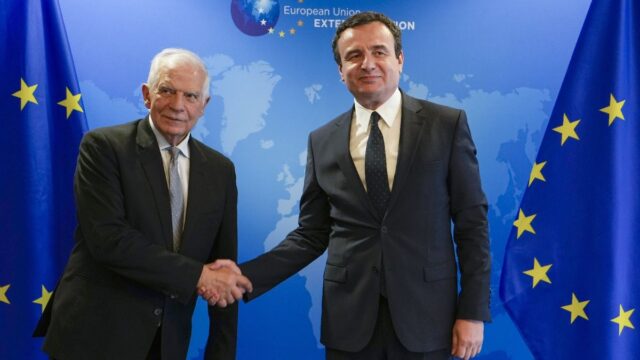The European Commission has warned both Belgrade and Pristina that refusal to compromise jeopardizes Serbia and Kosovo’s chances of joining the European Union (EU).
The European Comission has warned Kosovo that the closure by the Police of several branches of postal service of Serbia could have “very negative consequences” for the local population and violates the agreements of the EU facilitated dialogue.
At least nine branches of the Serbian Postal entity were attacked on Monday by the Police in northern Kosovo, in what the EU described it’s a statement of “unilateral and uncoordinated measure“.
A European Commission spokesperson added on Tuesday that “the EU has said very clearly what we expect of (Kosovo Prime Minister Albin) Kurti’s Administration.
“We hope that you will reconsider and address this issue within the framework of the EU-facilitated Dialogue, that you will present a proposal that addresses the possible negative repercussions of this decision on the population of northern Kosovo“, the spokesperson also declared.
Frictions jeopardize Serbia and Kosovo’s chances of joining the EU
Tensions between Serbia and Kosovo (whose independence from Serbia in 2008 Belgrade does not recognize) increased last year after a dispute over the validity of local elections in the predominantly Serbian part of northern Kosovo, which sparked violent unrest.
The EU adopted temporary measures against Kosovo due to violence, including the suspension of high-level contacts and financial cooperation. Pristina has since decreed that the euroits official currency since 2002, be the single legal currency in Kosovo, effectively banning the use of the Serbian dinar. This currency is widely used by Kosovo’s Serbian minority, which depends on financial aid from the Serbian Government and accesses funds through Serbian institutions such as banks and Serbian Post.
Belgrade denounced Monday’s closures as “one more example of the open show of force and the illegal actions of the temporary institutions of self-government of Pristina“.
Asked whether Pristina’s latest move could have consequences at the EU level, the Commission spokesperson added: “The fact that the EU introduced measures against Kosovo last year is a reflection of steps that led to an escalation“.
“Now we see more unilateral measures, more uncoordinated actions. This is not really a de-escalation, but rather leads to further escalation. I think this should be understood very clearly by the decision makers in Pristina,” he added.
Brussels has warned both Belgrade and Pristina that the refusal to compromise jeopardizes Serbia and Kosovo’s chances of joining the bloc.







